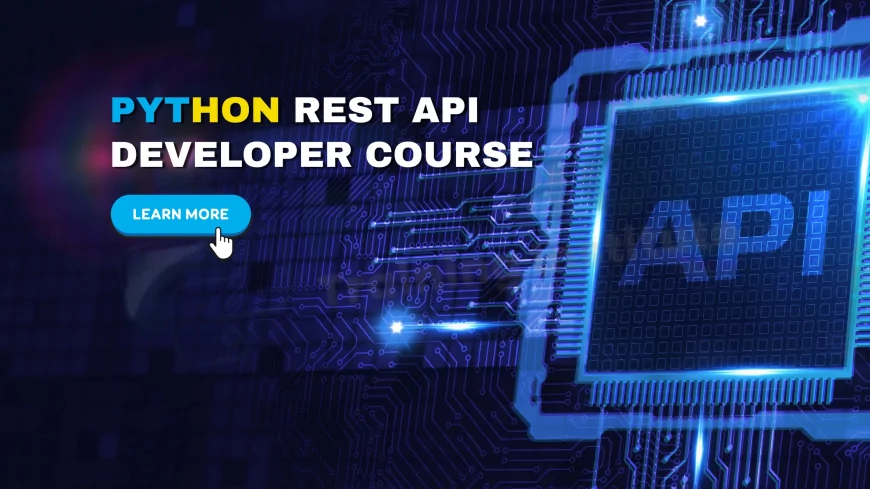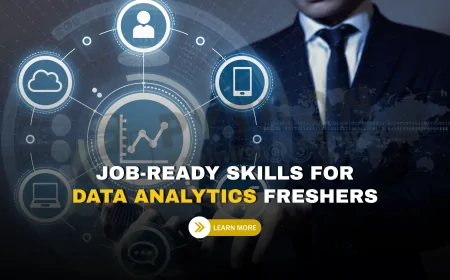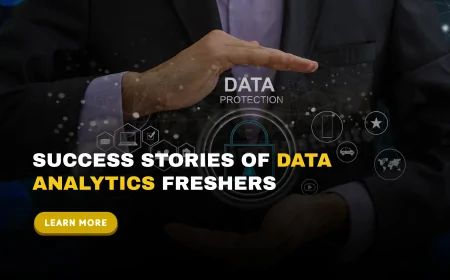Python Backend APIs Development Training Pune | Python REST API Developer Training in Pune
Enroll in Python Backend APIs Development Training in Pune to master Flask, Django REST, and full-stack backend programming. Includes certification, real projects, and 100% placement support.

Table of Contents
- Why Learn Python for Backend API Development?
- Who Should Join This Course?
- Course Curriculum
- Skills You Will Learn
- Tools & Frameworks Covered
- Real-World Projects
- Certification Benefits
- Top Institutes in Pune
- Career Opportunities & Job Roles
- Placement & Internship Support
- Course Duration & Fees
- Batch Timing & Flexibility
- Corporate Training Options
- Portfolio Building & GitHub Projects
- Success Stories from Pune
- How It Differs from General Python Training
- Future Scope & Industry Demand
- FAQs
- Conclusion
Why Learn Python for Backend API Development?
Backend development is made efficient with Python, especially when using frameworks such as Flask, Django, and FastAPI. APIs built using Python power websites, mobile apps, and SaaS products globally.
Who Should Join This Course?
- Computer science students and graduates
- Frontend developers aiming to go full-stack
- QA and DevOps engineers
- Working professionals seeking a backend specialization
- Freelancers and startup founders
Course Curriculum
- Python Fundamentals: Data types, control flow, functions
- Object-Oriented Programming
- Flask and Django Web Frameworks
- Building REST APIs
- Database Integration: SQL and NoSQL
- JWT Authentication and Middleware
- API Testing with Postman
- Deployment on Heroku, AWS, or PythonAnywhere
Skills You Will Learn
- API creation using Flask and Django
- Database design and ORM
- API versioning and documentation
- Token-based authentication
- Error handling and unit testing
- Continuous integration and deployment (CI/CD)
Tools & Frameworks Covered
- Flask
- Django REST Framework
- FastAPI
- SQLite, PostgreSQL, MongoDB
- Git and GitHub
- Postman, Docker, Jenkins
Real-World Projects
- Blog API with JWT Authentication
- Task Manager with user roles
- Inventory and Order Management System
- Microservices-based eCommerce backend
- Student & Course Management APIs
Certification Benefits
Most established Python institutes in Pune issue certificates to students who finish the course successfully. These certifications are beneficial for job interviews and add credibility to your LinkedIn and resume profiles.
Top Institutes in Pune
WebAsha Technologies –
Key Highlights
-
Official Python Training Center
WebAsha provides a complete Python curriculum—from beginner to advanced topics—along with real-time projects, small interactive batches, and flexible schedules to suit working professionals and freshers alike. -
Career-Oriented & Placement-Focused
Their programs are explicitly job-oriented, offering placement assistance, resume workshops, mock interviews, and internship tie-ups. -
Hands-On Learning Environment
The institute emphasizes practical experience with live projects, case studies, fully equipped lab environments, and 24/7 access to resources . -
Flexible Learning Options
Courses are available in multiple modalities—online, offline, weekend, full-time, and corporate batches—to meet learners’ diverse needs. -
Affordable & Structured
WebAsha offers globally recognized courseware, official curriculum, and customizable programs at competitive prices with EMI options.
Why Choose WebAsha?
-
Comprehensive, up-to-date curriculum across multiple domains
-
Practical, project-centric training environment
-
Strong placement and internship support
-
Positive reviews from students and employees
-
Flexible learning schedules for diverse learner categories
Would you like help with:
-
Syllabus breakdown and fee structure for Python
-
Demo class scheduling or batch availability
-
Direct enrollment links or early-bird discounts?
Feel free to ask—would be happy to assist you further!
Career Opportunities & Job Roles
- Python Backend Developer
- API Engineer
- Full-Stack Developer
- Software Engineer (Backend)
- DevOps Engineer with Python
Placement & Internship Support
Reputed training providers offer 100% placement assistance with job referrals, resume guidance, interview preparation, and access to internship opportunities across Pune-based startups and tech firms.
Course Duration & Fees
- Duration: 8–12 weeks
- Fees: ₹10,000 to ₹20,000 depending on institute and batch format
- EMI, scholarships, and group discounts available
Batch Timing & Flexibility
Weekend, weekday, morning, evening, and self-paced batches are available. Flexible enough to accommodate students and working professionals.
Corporate Training Options
Custom training modules for IT companies and startups are offered by institutes like WebAsha and Technogeeks to upskill their backend engineering teams.
Portfolio Building & GitHub Projects
Students are guided to publish their work on GitHub, build a personal portfolio website, and showcase real-world APIs which are often used during job interviews and technical screenings.
Success Stories from Pune
Many graduates from these courses now work at top companies like Infosys, Cognizant, TCS, Persistent Systems, and unicorn startups. Transitioning from non-tech roles to Python backend development is a common success path.
How It Differs from General Python Training
General Python courses focus on syntax, logic, and basic scripting. In contrast, backend API training is career-focused, project-oriented, and aligned with real job skills required in tech companies.
Future Scope & Industry Demand
The demand for backend API developers is continuously growing due to the proliferation of web apps, mobile-first SaaS platforms, and data-driven microservices. Python continues to lead in backend jobs globally.
FAQs
1. What is backend development in Python?
Backend development involves server-side scripting, database handling, and building APIs using frameworks like Django and Flask.
2. Which Python frameworks are best for API development?
Flask, Django REST Framework, and FastAPI are most commonly used for backend API development in Python.
3. Is this course beginner-friendly?
Yes, courses start from Python basics and gradually move into advanced backend concepts.
4. Do I need to learn frontend development too?
No, but having basic knowledge of HTML and JavaScript helps in understanding API integration.
5. What are the job roles after this course?
Python Backend Developer, API Engineer, Full-Stack Developer, and Software Engineer are common roles you can pursue.
6. Will I receive a certificate?
Yes, every reputed institute offers a course completion certificate.
7. Can I take this course online?
Yes, many institutes offer both online and offline classes with live instructor support.
8. Will I build real APIs during training?
Absolutely! You'll build multiple live projects and deploy them on cloud platforms like Heroku or AWS.
9. What is the average salary after completing this course?
Entry-level backend developers earn ₹4–7 LPA, while experienced professionals earn ₹10–15 LPA or more.
10. Are there weekend batch options?
Yes. Weekend batches are ideal for working professionals and part-time learners.
11. Is placement support guaranteed?
Top institutes provide 100% placement support with resume help, mock interviews, and job referrals.
12. Do I need a tech background to enroll?
No. Anyone with basic computer knowledge and logical thinking can join.
13. What are the main databases used in training?
PostgreSQL, SQLite, and sometimes MongoDB are used for backend database management.
14. Can I learn backend development as a freelancer?
Yes. Many freelancers take this course to build APIs for mobile apps, websites, and startups.
15. Will I learn Git and version control?
Yes. Version control using Git and GitHub is part of the course curriculum.
16. How is testing done for APIs?
Using tools like Postman, PyTest, and unittest to validate endpoints, errors, and responses.
17. Can I deploy my API on cloud platforms?
Yes. You’ll learn to deploy on Heroku, AWS, or other PaaS providers.
18. Is this suitable for college students?
Yes. Final-year students or recent grads can benefit greatly from this industry-ready course.
19. Do I get access to course material after completion?
Yes. Institutes usually provide lifetime access to LMS materials and recordings.
20. Is there any difference between Flask and Django?
Yes. Flask is lightweight and flexible, while Django is feature-rich and ideal for larger projects. Both are taught in most courses.
Conclusion
Backend development using Python is an essential and lucrative skill in today’s software-driven world. With dedicated training in API development, you’ll not only master popular frameworks like Flask and Django but also build deployable, secure, and scalable applications that solve real-world problems.
In Pune, you’ll find top-tier institutes offering expert-led training, flexible batches, placement support, and portfolio-building tools. Whether you're a beginner or a professional aiming to shift into backend development, Python API training can launch your career to new heights.
Start today—your future as a skilled Python backend developer awaits in Pune!
What's Your Reaction?
 Like
0
Like
0
 Dislike
0
Dislike
0
 Love
0
Love
0
 Funny
0
Funny
0
 Angry
0
Angry
0
 Sad
0
Sad
0
 Wow
0
Wow
0
















